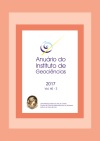Research and Applications in Geotechnologies: a Scientometric Study of the Midwest Region of Brazil
DOI:
https://doi.org/10.11137/2017_3_232_239Palavras-chave:
Geotechnologies, Geoprocessing, Remote sensing, Pantanal, GPS, GNSSResumo
This scientometric study describes the state of the art of scientiic production, with a focus on the use and production of geotechnologies, based on a survey of the research groups in the Midwest region of Brazil. Information on the research groups registered in the Research Groups Directory of the National Council of Scientiic and Technological Research (CNPq) was collected using the terms, “Geotechnologies”, “Geoprocessing”, “Remote Sensing”, “Cartography”, “Pantanal Geotechnologies”, “GPS”, and “GNSS”. These terms were searched as part of the name of the research group, the line of research, or as keywords in the line of research. The survey showed that there are a considerable number of research groups using Geotechnologies, both in research and in teaching institutions of the region, across diferent areas of knowledge. From the 117 research groups of the Midwest region of Brazil registered at CNPq, 49 reported working in Remote Sensing, 48 in Geoprocessing, 33 in Cartography, 28 in Geotechnologies, two n Pantanal Geotechnologies, six in GPS, and one in GNSS. With respect to the areas of knowledge, 22% are from Engineering disciplines (Sanitary, Forestry, Agricultural, and Civil), 19% are from Geography, and 14% from Agronomy, while the other areas of knowledge represent 1–5% of the remaining groups. Further, it was found that that 6 of 15 institutions in the region host 78% of the research groups.Downloads
Publicado
2019-07-30
Edição
Seção
Artigos
Licença
Os artigos publicados nesta revista se encontram sob a llicença Creative Commons — Atribuição 4.0 Internacional — CC BY 4.0, que permite o uso, distribuição e reprodução em qualquer meio, contanto que o trabalho original seja devidamente citado.
















 Exceto onde indicado de outra forma, o conteúdo deste site é licenciado sob uma licença
Exceto onde indicado de outra forma, o conteúdo deste site é licenciado sob uma licença 